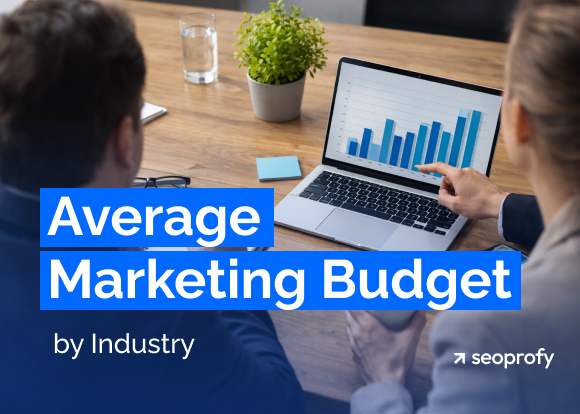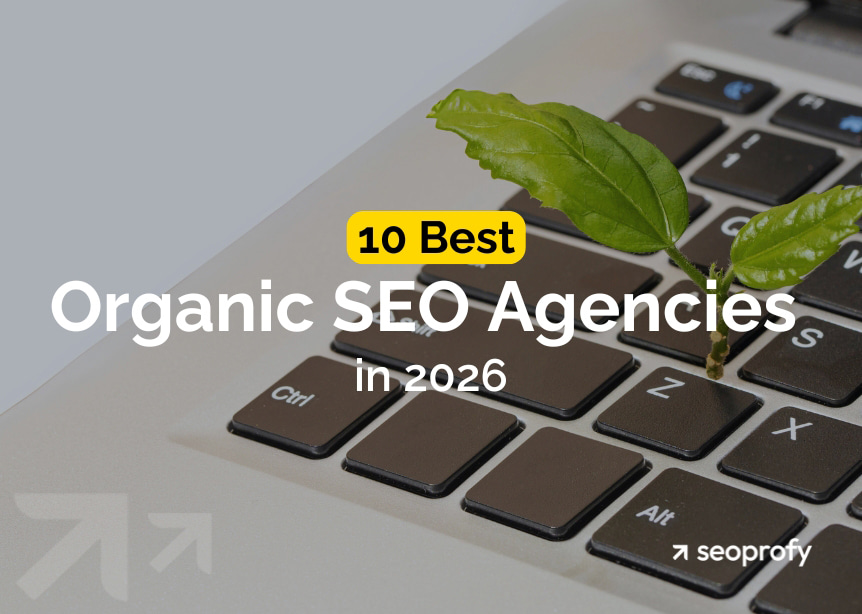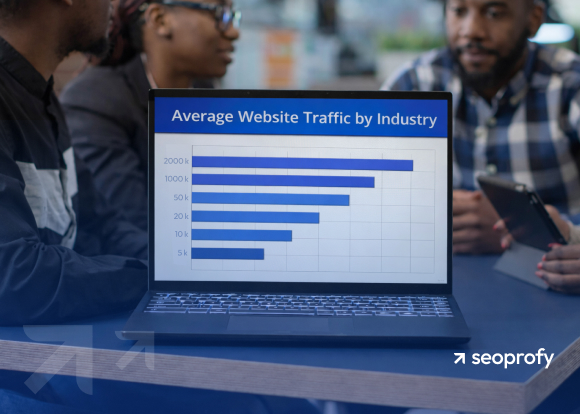If you’re a B2B marketer or an SEO specialist, you already know how critical it is to back your decisions with data. For this reason, we’ve gone through industry reports from sources like HubSpot, SageFrog, Content Marketing Institute, and others to show you the latest B2B SEO stats and trends.
In this article, we’ll go over how B2B buyers are searching for products and services nowadays, the struggles they have, and also which content formats deliver the most leads and ROI. You’ll also see how AI is influencing marketing strategies and get practical ideas on where to focus your efforts this year to bring in more clients and grow your business.
- 91% of B2B buyers prefer purchasing online.
- Google holds 84.9% of the search engine market share and is the main platform for the B2B audience.
- In B2B, organic search generates 44.6% of all revenue and is the largest channel.
- 93% of marketers say video marketing has given them a good ROI.
- 74% of marketers agree that content marketing helped them generate more demand and leads.
- 88% of marketers plan to keep or increase their budgets on SEO.
- 30% of B2B companies prioritize SEO and place it as the second most popular marketing investment.
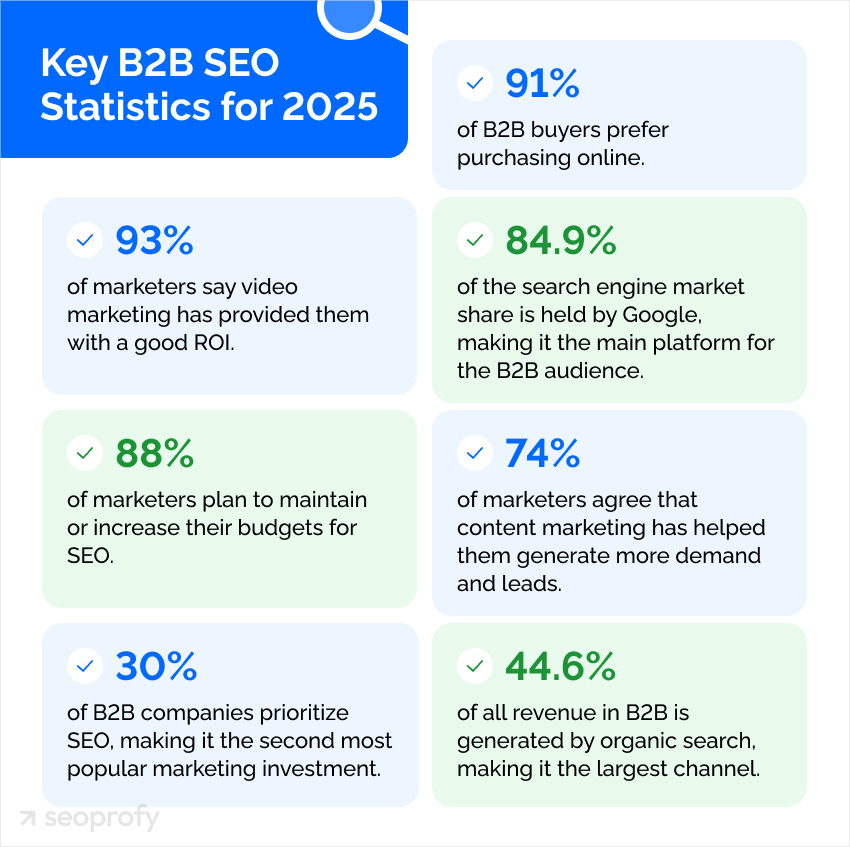
General B2B SEO Statistics
SEO has been an important part of B2B marketing for years because buyers in this industry use online research to make decisions. Most of this research starts with a search engine and often leads them directly to a company’s website.
That’s where stakeholders go to learn about a business and what it offers. With a well-executed SEO and content strategy, B2B companies can answer their questions, provide solutions, and help them move forward in the buying process.
We’ll look at the traffic sources and how they influence buyer behavior in the next section, but for now, here are some stats that show the role of SEO in B2B:
- 29% of marketers say they use SEO marketing in their overall strategy. (HubSpot)
- 30% of B2B companies prioritize SEO and place it as the second most popular marketing investment. (Statista)
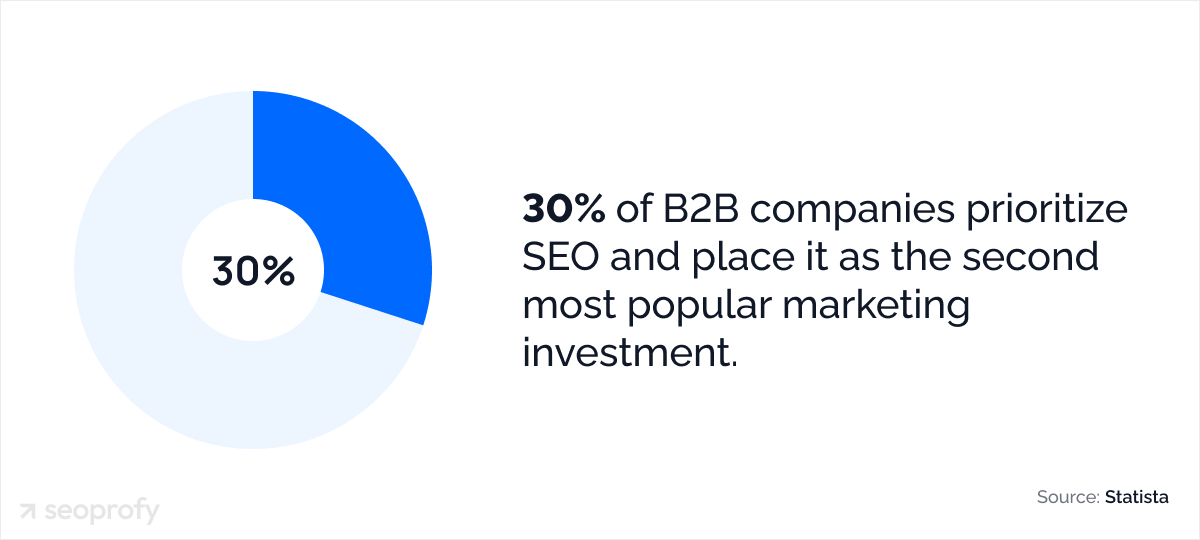
- The B2B SaaS websites that segment their target audience by industry increased organic traffic on average by 28.7% vs. 4.1% for those without segmentation. (StrataBeat)
- 50.6% of B2B companies that opt for organic link building report better results compared to those using manual outreach, where only 35.3% see success. (SiegeMedia)
- SEO is the top marketing tactic for B2B companies, with 49% of marketers using it in their strategies. (SageFrog)
- 49% of all B2B spending is online. (VML)
B2B Website Traffic Sources
So, where does most of the B2B traffic come from? Unsurprisingly, Google and other search engines lead the way. Our SEO statistics show that 66% of B2B buyers in the US search online for products before making a purchase.
However, since most clicks go to the first page and the top three organic search results, companies need to prioritize ranking higher for relevant keywords to capture some of this traffic. With that said, here are the B2B SEO statistics that illustrate the distribution of these sources:
- Google holds 84.9% of the search engine market share and is the main platform for the B2B audience. (FirstPageSage)
- 91% of B2B buyers prefer purchasing online. (Amazon Business)
- 76% of all traffic to B2B websites comes from search engines. (BrightEdge)
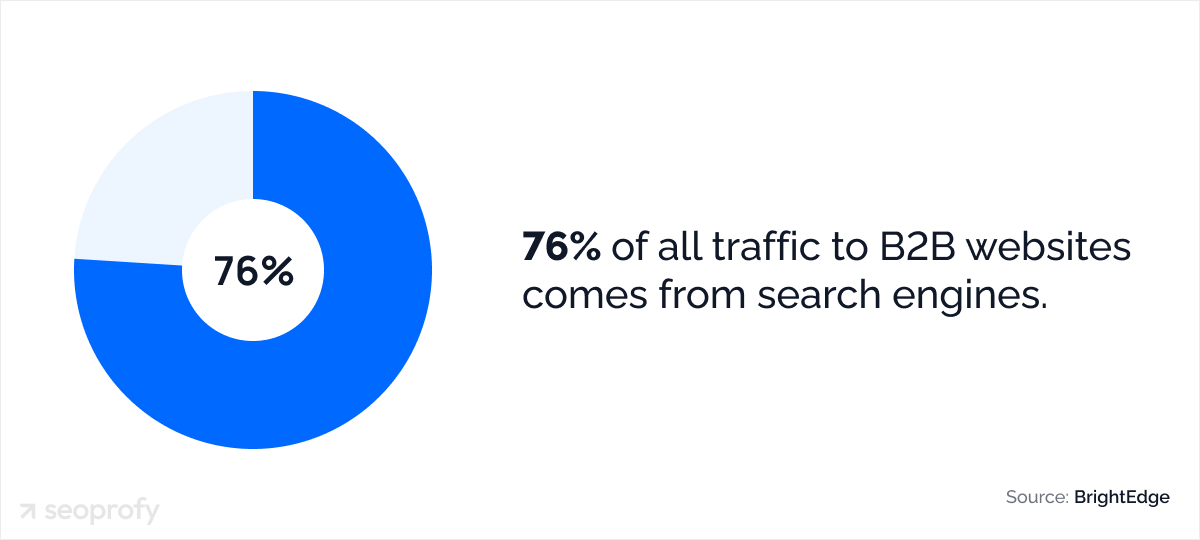
- 37% of B2B buyers prefer to use businesses’ websites to make a purchase. (Statista)
- A company’s website remains the best place to host content, with 63% of people saying they visit websites directly to find the information they need. (Isoline)
- 67% of B2B buyers start their purchase journeys online. (VML)
- 53% of website visits come from unpaid Google search results. (BrightEdge)
B2B Content Marketing Statistics
Content has always been the go-to way for businesses to educate their audience, build trust, and stay top of mind. Research from the CMI found that in 2024, content helped B2B companies grow brand awareness, generate leads, and cut customer acquisition costs, among other things.
What makes content so effective is that B2B marketing teams can personalize it to speak to individual decision-makers and influencers in specific accounts or industries. As for the formats, short-form articles and original research tend to work especially well.
Additionally, free online tools can support your efforts and attract more organic traffic and backlinks to your site. Here are the stats that show this:
- 79% of B2B marketers reported their organization has a content marketing strategy. (Content Marketing Institute)
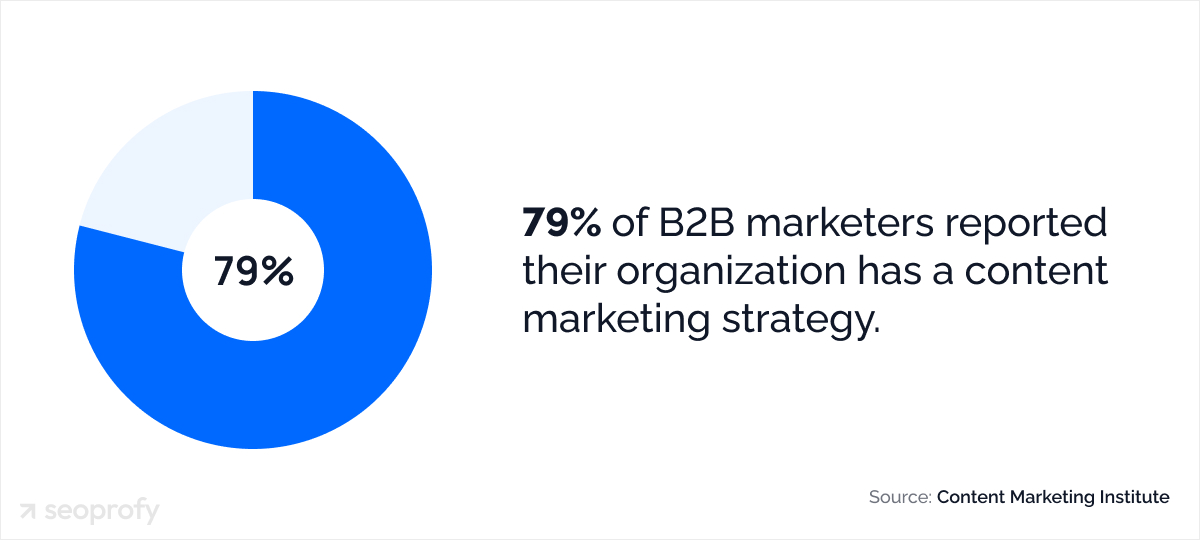
- 65% of B2B buyers prefer short-form content like blog posts and infographics, while long-form content ranks third in appeal. (DemandGen)
- Websites with original research had an average 42.2% growth in backlinks, and 96.9% gained more links overall. (StrataBeat)
- 33% of marketers are posting blogs and articles as part of their marketing and SEO strategy. (HubSpot)
- 24% of B2B companies say they don’t have a dedicated content marketing team. (Content Marketing Institute)
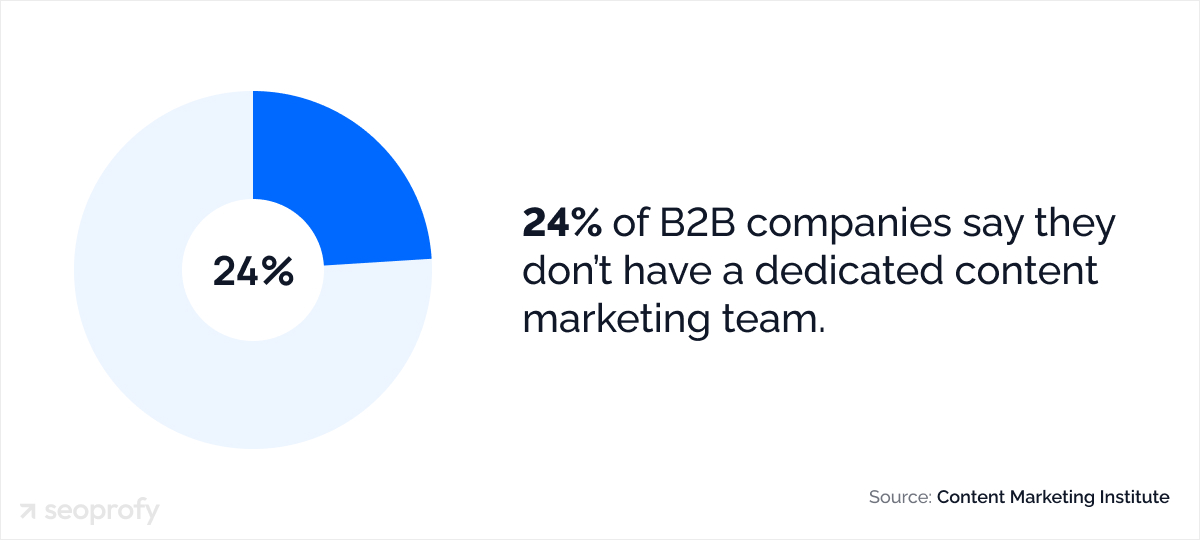
- Websites that offer free online tools, such as ROI or TCO calculators, increased Google’s monthly organic traffic year-over-year by 35.6%. (StrataBeat)
- Companies that spend more than $4,000 per post are 2.6 times more likely to say their strategy is “very successful” compared to those spending $0–$500. (SiegeMedia)
- A B2B audience consumes around 4.5 pieces of content before reaching out to a salesperson. (Isoline)
- The B2B SaaS websites that offer original research increased organic traffic on average by 29.7% vs. 9.3% for those that didn’t. (StrataBeat)
- 84% of marketers use a blog/corporate website to distribute content. (Content Marketing Institute)
- Websites and blogs are the second preferred digital marketing channels among B2B marketers, with 36% using them. (Statista)
- The B2B companies that published 9+ blog posts per month increased Google monthly website traffic year-over-year by 35.8% vs. 16.5% for those blogging 1-4 times monthly. (StrataBeat)
- 87% of marketers state that they increased brand awareness with the help of content marketing. (Content Marketing Institute)
B2B SEO ROI Statistics
Every B2B marketing strategy has one end goal — more sales and revenue. As you’ll see in the stats below, SEO and content both play a part in making that happen. With an average ROI of 702% in B2B SaaS and nearly half of all revenue coming from organic search, it’s clear that SEO is the channel that’s worth the investment.
That said, figuring out which channels lead to sales can still be tricky since the B2B buyer’s journey isn’t always a straight line. Even so, according to HubSpot, websites, blogs, and SEO were among the top channels driving ROI for B2B brands in 2024. Here are some other growth statistics that back this up:
- In B2B SaaS, the average ROI from SEO is 702%, with a break-even time of just 7 months. (SeoProfy)
- 70% of marketers say SEO generates more sales than PPC. (DataBox)
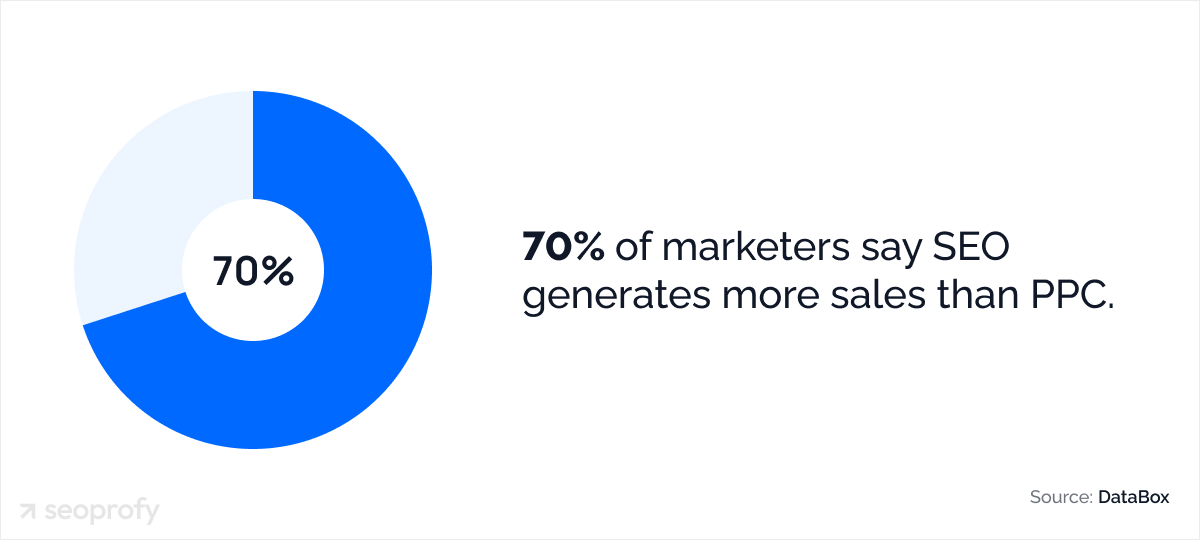
- 56% of B2B marketers struggle to attribute ROI to their content marketing efforts. (CMI)
- Organic search is seen as the most effective revenue driver and 22% of B2B marketers agree with this fact. (Wpromote)
- B2B companies generate twice as much revenue from search engine optimization than any other channel (BrightEdge)
- Video is the media format that has the highest ROI, followed by images, blog posts, podcasts, or other audio content. (HubSpot)
- In businesses-to-business industries, organic search generates 44.6% of all revenue, which directly shows the SEO’s impact on B2B sales. (BrightEdge)
- The average B2B SEO conversion rates across industries range from 1.1% to 7.4%. (FirstPageSage)
- 49 percent of marketers agree that they were able to achieve more sales/purchases with the help of content. (CMI)
- 16% of marketers confirmed that SEO (website/blog) delivers the highest ROI, tying with social media. (HubSpot)
Mobile B2B SEO Statistics
Our local SEO statistics show that 63% of people choose to use mobile to research new brands and products. Still, recent study showed that many websites don’t offer the best mobile experience, especially for ordering.
Respondents mentioned B2B SEO challenges like confusing navigation and trouble tracking orders — all areas that need attention. So, if your site isn’t mobile-friendly, this might be something you need to prioritize this year.
Your pages should be responsive, and it shouldn’t feel like a quest for visitors to find the information they need on your site. It’s important not only for user experience but also for Google as it’s one of the B2B SEO ranking factors. Here are some of the stats that show the importance of mobile optimization:
- Almost half of the web traffic worldwide comes from mobile devices. (Statista)
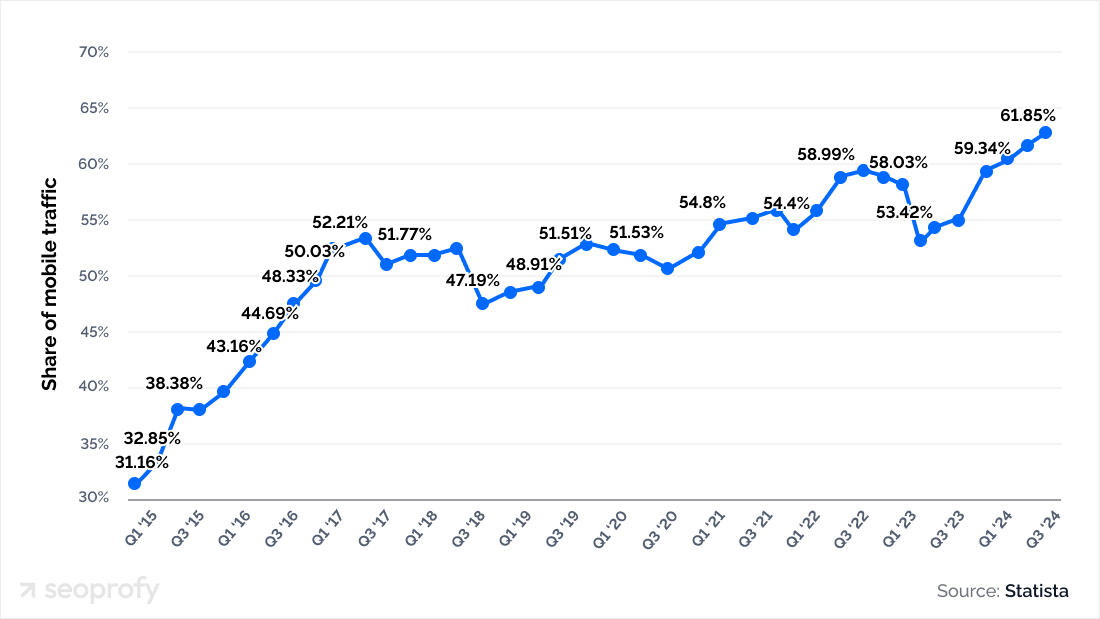
- 72.6% of internet users will access the web exclusively on mobile devices by the end of this year. (CNBC)
- 71% of B2B buyers wish they could have a better experience on mobile. (VML)
- 29% of buyers say mobile ordering is an area that needs improvement on B2B websites. (Sana)
B2B Video Marketing Statistics
Videos can improve your B2B SEO efforts in multiple ways. 84% of marketers say that adding videos to their content helps keep visitors on the page longer, a metric known as dwell time. This is important because when people spend more time on your site, it signals to Google that your content is relevant and useful.
Over time, this can lead to higher keyword rankings in search engine results and help you reach more of your target audience. Video content is also highly effective for lead generation, especially for SaaS businesses.
It is one of the reasons why marketing reports from HubSpot, SageFrog, and Content Marketing Institute predict that this year, B2B marketers will be focusing more on video in their strategies. Here are the stats that show this trend:
- 50% of marketers are leveraging video in their overall strategy. (HubSpot)
- 96% of video marketers say video has helped them increase brand awareness. (Wyzowl)
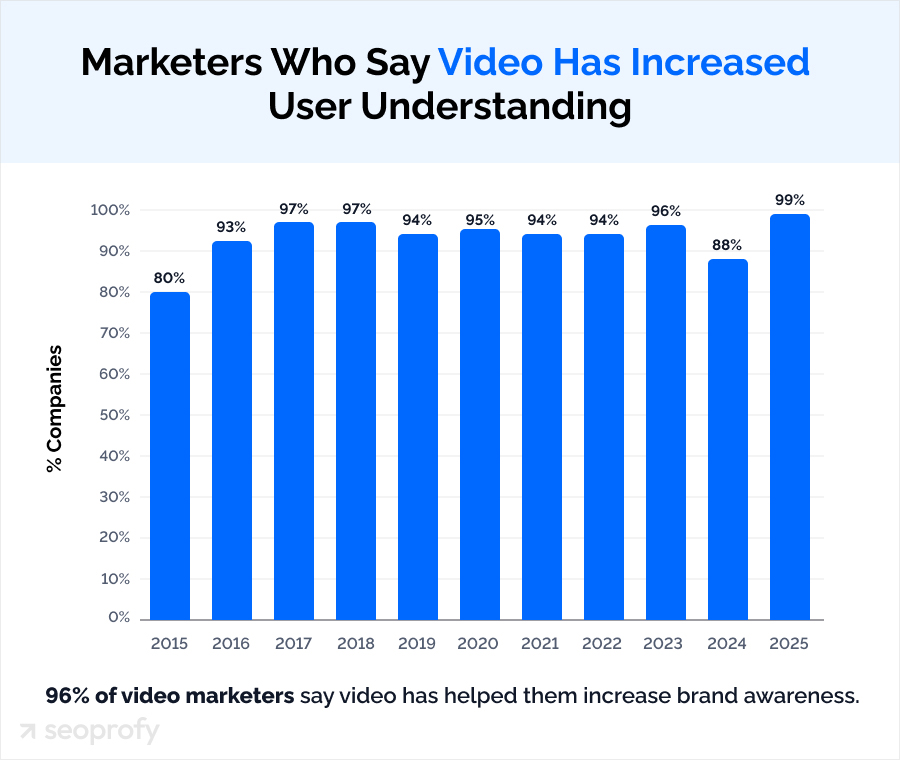
- Video marketing is one of the top marketing and sales priorities for B2B companies in 2025. (SageFrog)
- The most popular content format for business-facing brands is short-form video, followed closely by images. (HubSpot)
- 55% of B2B buyers consider video the most helpful content type. (Isoline)
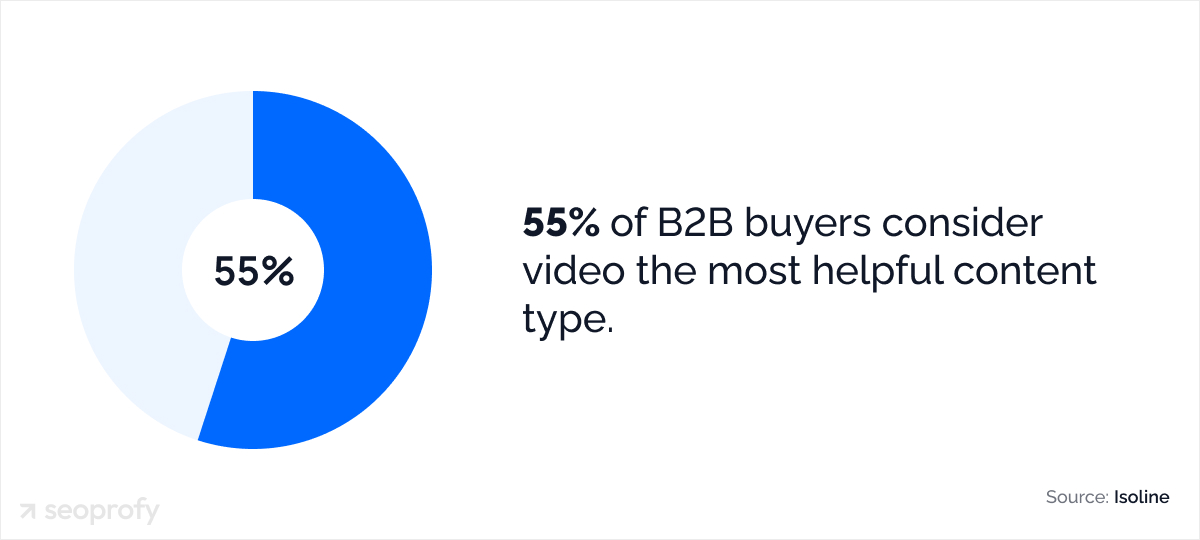
- 58% of marketers agree that videos deliver the best results for B2B companies, with the case studies coming next. (Content Marketing Institute)
- 93% of marketers say video marketing has given them a good ROI. (Wyzowl)
B2B Digital Marketing Statistics in Lead Generation
At our B2B SEO agency, we know that lead generation is one of the hardest parts of running a business. There are plenty of ways to nurture leads and close sales, but even the best B2B companies often struggle to find them in the first place.
Although no one approach to driving leads is guaranteed, some strategies seem to work better than others. From what we’ve seen in the reports, in-person events are expected to take the lead in 2026.
It makes sense — no matter how much technology advances, people still want to meet people behind the brands. At the same time, videos, written content, and SEO continue to prove their worth in attracting qualified leads. Here’s what the numbers show:
- 45% of respondents said in-person events are their top source for sales and marketing leads. (SageFrog)
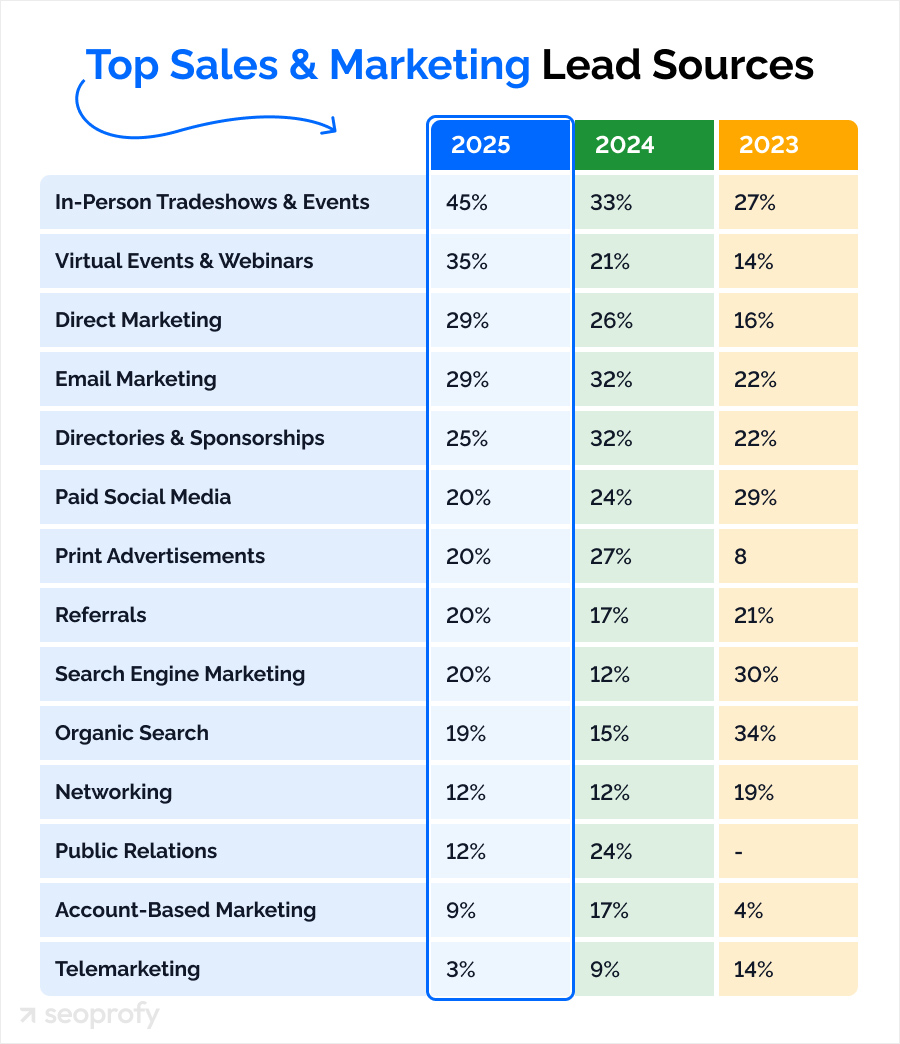
- Content marketing costs 62% less and brings in three times more leads than traditional marketing. (DemandMetric)
- 19% of respondents believe organic search is an effective channel for lead generation. (SageFrog)
- 74% of marketers say content marketing helped them generate more demand and leads. (Content Marketing Institute)
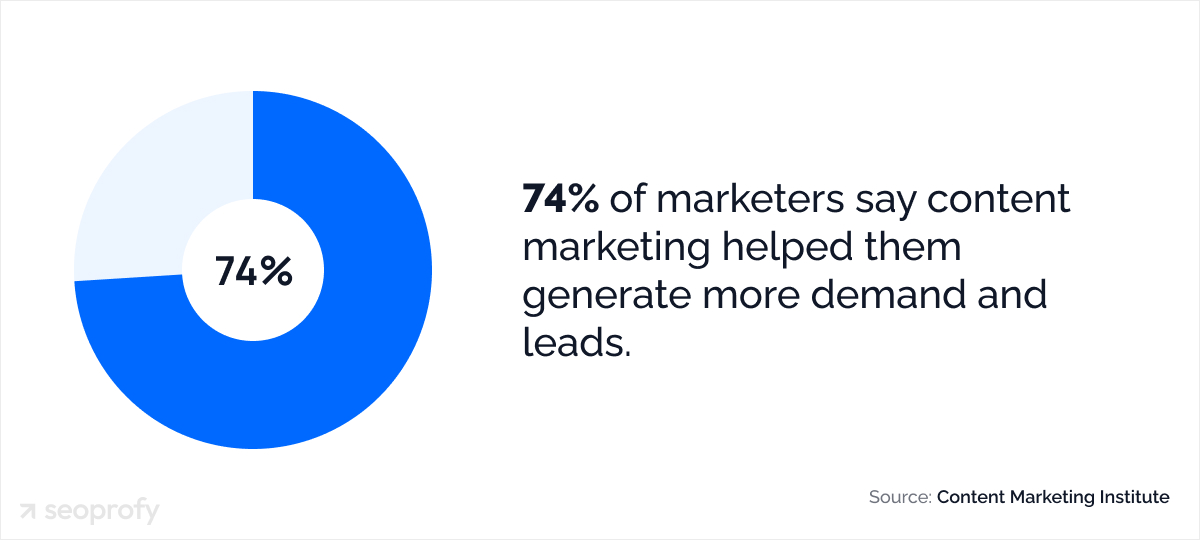
- More than half (53.1%) of respondents intend to allocate between $550 and $2,000 for each content asset this year. (SiegeMedia)
- Search engine strategies account for 34% of qualified leads for businesses. (SageFrog)
- 57% of B2B businesses believe SEO strategy generates more leads than any other marketing channel. (Gitnux)
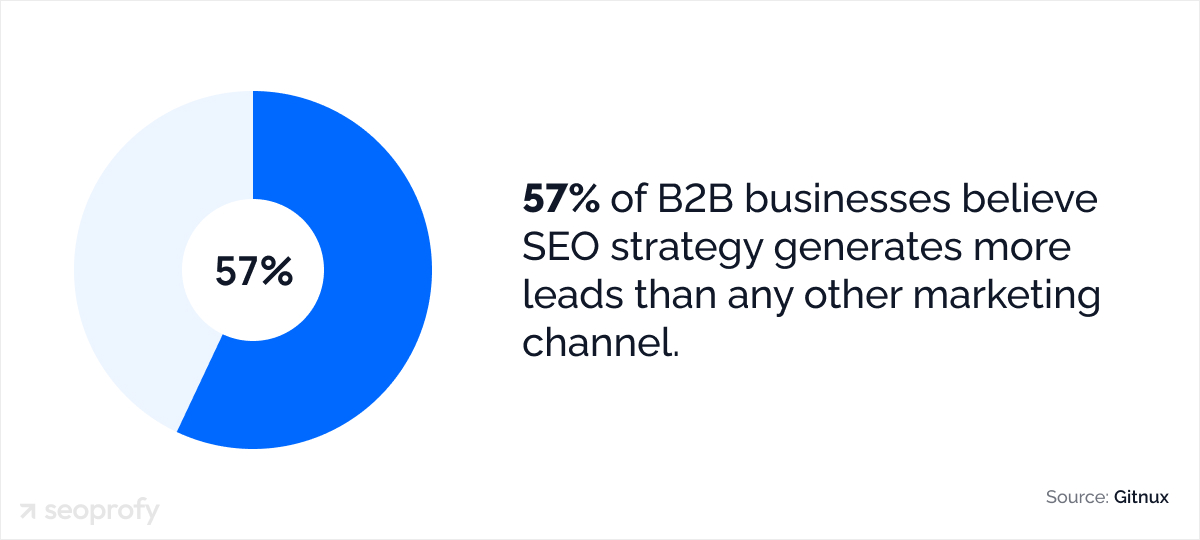
AI Trends in B2B Marketing Strategies
All of the marketing reports we’ve reviewed agree that AI will be the next big trend this year. B2B marketers are planning to use these tools to automate tasks, create personalized content, and even handle coding. Even with all its potential, AI doesn’t come without its challenges.
Our AI SEO statistics reveal that 30% of people feel generated content isn’t always reliable and worry it could harm a business’s relationship with its customers. Using these tools also means taking on responsibilities like safeguarding data, ensuring accuracy, and staying creative.
Despite the fact that there’s an evident learning curve, AI has great potential to improve research, content creation, and overall marketing strategies. Let’s look at the statistics that show this trend:
- 81% of B2B marketers use AI tools. (Content Marketing Institute)
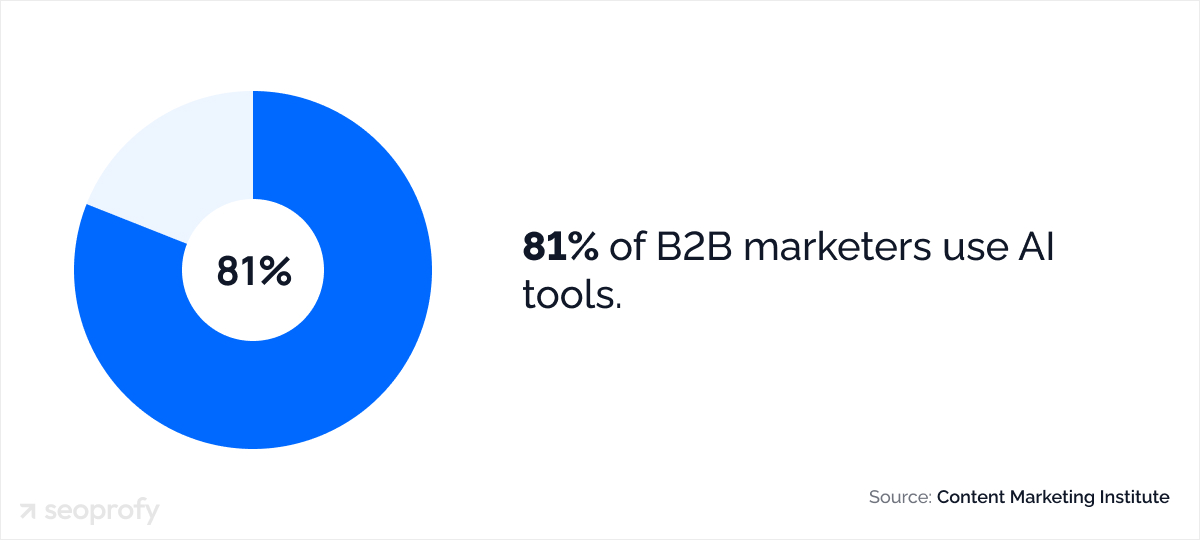
- 40% of respondents say they use AI tools to create overall strategies, like developing buyer personas. (SiegeMedia)
- More than 50% of B2B marketers will prioritize AI for automation tasks. (Content Marketing Institute)
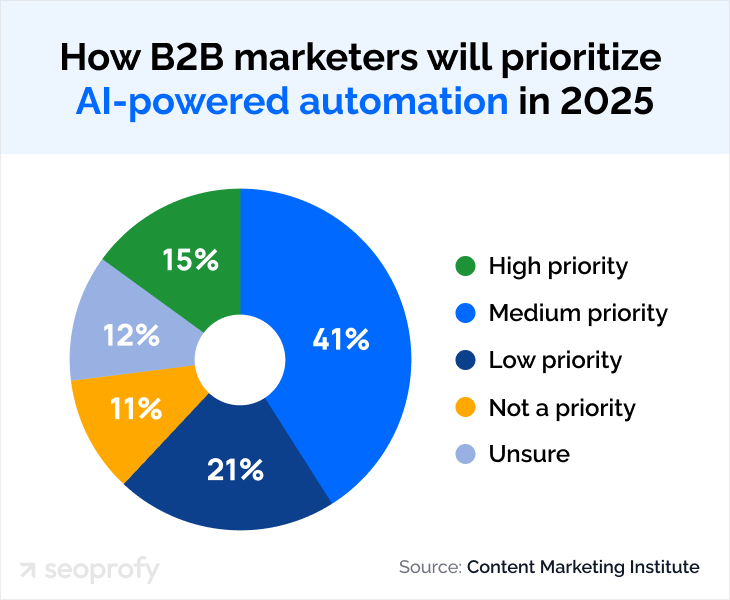
- One in five marketers plan to start using AI agents to automate marketing initiatives from end-to-end strategy to execution. (HubSpot)
- The top uses of AI include content creation (35%), data analysis (30%), and workflow automation (20%). (HubSpot)
- AI is going to be one of the key sales and marketing priorities for businesses in 2025. (SageFrog)
- The main use case of AI in B2B marketing is content marketing, followed by coding with 39%. (SageFrog)
- Three out of four marketers think AI-powered search engines will help their blogs, and 68% believe their websites will see more traffic because of it. (HubSpot)
B2B SEO Predictions and Future Plans
So, where do B2B companies plan to invest next year and what are the channels that marketers will prioritize in their strategies? Search engines like Google will remain important but there are also other changes on the horizon.
The research conducted by the Content Marketing Institute found that B2B marketers plan to spend more on AI for content and performance. And it’s one of the main changes when we compare it to previous years. Additionally, they plan to increase their budget for content marketing and video creation. Here are the stats that support this:
- This year, 54.5% of businesses say they’ll spend more on content marketing. (SiegeMedia)
- 39% of B2B marketers are planning to invest in AI to make their content better and more effective. (Content Marketing Institute)
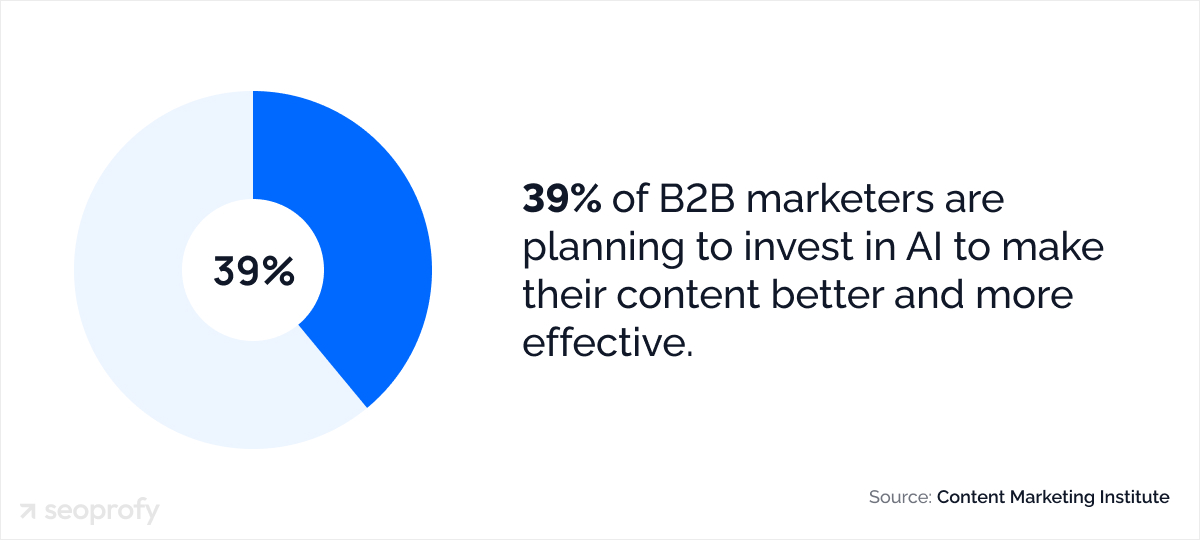
- In 2025, 46% of B2B marketers plan to increase their budgets for content marketing. (CMI)
- 92% of marketers plan to maintain or increase investments in brand awareness in 2025. (HubSpot)
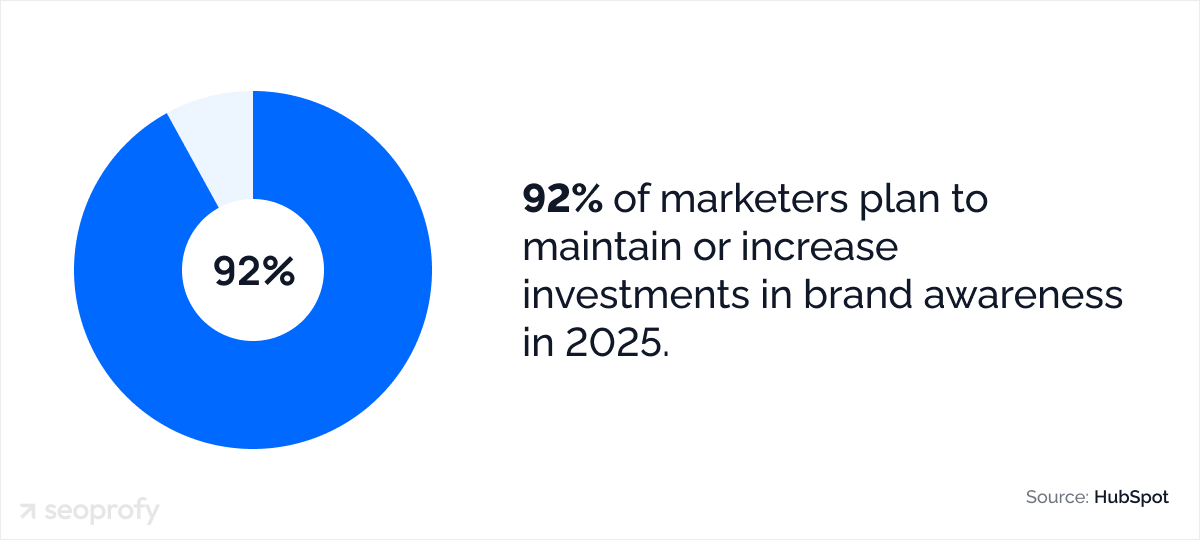
- 88% of marketers plan to keep or increase their budgets for search-related efforts. (HubSpot)
- 43% of marketers in B2B stated plans to increase their B2B content marketing budget in the next year. (Statista)
- 61% of B2B businesses think they’ll increase investment in videos in 2025, followed by thought leadership content (52%) and AI for content optimization (40%). (CMI)
Final Thoughts
As we advance through 2026, search behavior in B2B is shifting. People are now using their phones more and are looking for more personalized content and human connection. Hopefully, our report with the latest data has given you a well-rounded overview of new B2B SEO trends and changes, as well as ideas on where to focus your time and budget this year.
As for the takeaways from our B2B marketing statistics, if you’re not yet using videos in your strategy, this might be the content format to try this year. Through videos, you can show your products in action, tell your brand story, or educate your prospects. Video content is also highly engaging and can increase the effectiveness of your SEO strategy.
Finally, try to experiment with AI SEO tools to see how they can help you streamline tasks and become more efficient. With use cases that range from content marketing to automation and personalization, there are plenty of ways you can benefit from AI to reach your business goals and improve SEO performance.








